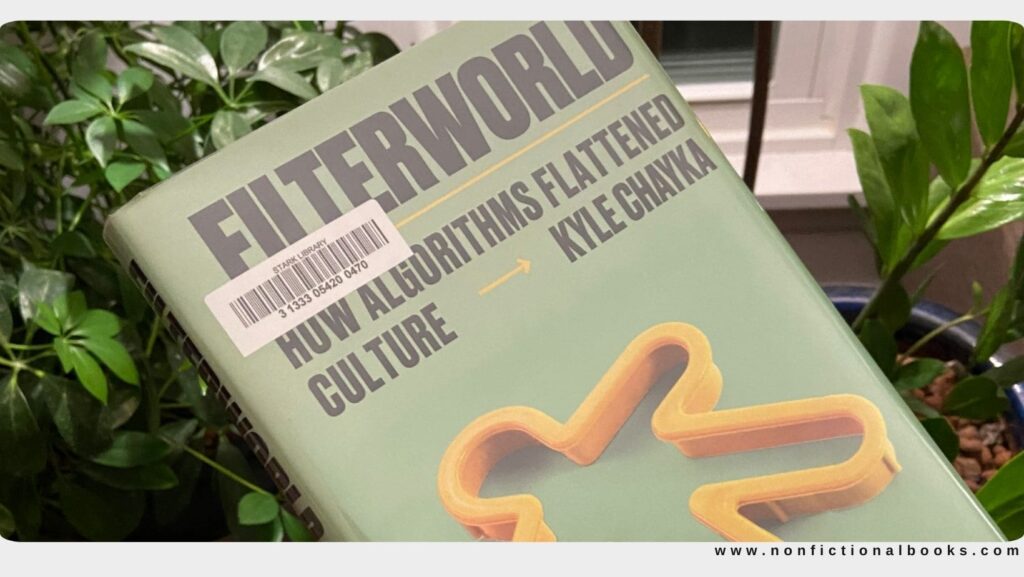Overview of Filterworld How Algorithms Flattened Culture Summary
Have you ever scrolled through your social media feed and felt a nagging sense of deja vu? The same styles, the same jokes, the same curated perfection – it’s enough to make you wonder if you’re trapped in a cultural echo chamber. According to Kyle Chayka, author of Filterworld: How Algorithms Flattened Culture, that’s exactly what’s happening.
Chayka argues that algorithms, those lines of code that power our online experiences, subtly shape our world into a homogenous landscape. They recommend music we already like, show us restaurants with trendy decor, and even influence the design of cities. This “Filterworld,” as Chayka calls it, prioritizes comfort and familiarity over surprise and discovery.
Introduction of Filterworld: How Algorithms Flattened Culture
As digitalization has enhanced, algorithms have emerged as the silent artists of our online papers. They govern what people see, learn, and engage with, thus molding people’s perspectives and knowledge about the world. This blog explores the dark reception of culture and the thesis that algorithms spread unifications.
The Rise of Algorithmic Culture:
Algorithms’ power is present in all sectors of internet life. This includes your social platform, streaming platforms, search engines like Google, and electronic commerce sites. Actually, it is the ability to classify the vast amount of digital content into similar groups and narrow it down to focus on our needs and likes, which is the primary function of algorithms. In addition, this personalization is equally functional on the floor, which unfortunately unintentionally results in the development of sounding rooms that buzz with only one voice and bubbles of like-minded people who would be the only ones to hear the selected content.
The Flattening of Culture:
The replacement of cultural diversity with algorithmic is one of the biggest cultural phenomena of modern times. The ever-increasing algorithms, which are focused more on viral content engagement than anything else, will never give peace to topics of interest and marginalized voices, which often keep getting muffled within the virtual chaos. This massive influence on the culture resulted in goods being viewed as something easy to purchase in the marketplace, with the vanilla content supplied by these related artists and content creators heavily influencing the net space and the lack of alternative content.
Moreover, the unremitting quest for virality forces the authors to compromise on credibility by implanting sensationalism completely into their work and failing to consider the nuances. For Filterworld, creation is just turned into a commodity, and being unique is enjoying the victory, and thus you hardly find a culture that has depth and complexity.
The Impact on Creativity and Innovation:
In Filterworld, creativity and innovation are suppressed in the tight spaces of algorithmically defined preferences. At this stage of the suffocation of originality, not only the cultural range of varieties is impaired, but also our possibilities for invention and discovery are deterred.
In addition to this, the fact that “brief-time period “metrics such as likes, shares, and views reinforce the tendency for producers to accept quantity over quality suggests that negative consequences could occur as a result.
The Erosion of Cultural Gatekeepers:
Before the virtual world setting up was met, the cultural gatekeepers, which included publishers, file labels, and movie studios, executed an essential duty of rejection and selection of content for the public. Nevertheless, the approach to the virtual age, which led to the evolution of the content creation process with the consequence of the depreciation of gatekeepers, contributed to the uprising of a less-regulated and more democratic cultural environment.
Filterworld is where an ordinary person quickly turns into an influencer, content creator, journalist, or even celebrity by just having an internet connection and a phone, regardless of their knowledge or expertise. This is because the newbie becomes an expert, and the real becomes fake.
The Way Forward:
Filterworld directs the way, of course, for the future of the subculture-to-be. It not only gives opportunities but also challenges. While algorithms have brought the availability of facts into the hands of those whose voice was previously unused and enabled smaller groups, they have in addition helped to perpetuate the cycle of uniformity and standardisation that might in the end dehumanise the remarkable and diverse expression forms of human beings.
If we are to avoid being victims of the pulling-down effects of an algorithmic lifestyle, then humanity and creativity should be seen as essential parts of our social media interactions, together with insightful discussions. This therefore entails a unified effort to counter algorithmic suggestions from media platforms, which we are actively working on for the purpose of unveiling the hidden sounds and voices of statistics and proposals.
Moreover, platforms and policymakers should take proactive steps to mitigate the bad outcomes of algorithmic tradition, along with regulating the usage of algorithms in content material curation and promoting transparency and duty in their choice-making processes.
Conclusion of Filterworld How Algorithms Flattened Culture Book Review and Summary
In the end, Filterworld represents a double-edged sword within the realm of lifestyle. While algorithms have democratized access to information and empowered individuals to specificize themselves in extraordinary ways, they’ve additionally perpetuated a cycle of homogenization and conformity that threatens to undermine the richness and diversity of human expression. Only by recognizing the profound impact of algorithms on lifestyle and taking proactive steps to mitigate their terrible effects can we wish to preserve the integrity and authenticity of cultural expression in the virtual age.

Book Review of Filterworld: How Algorithms Flattened Culture Summary
“Internet customers have taught us that the pleasant consequences are the greatest,” writes Kyle Chayka in his new e-book, “Filterworld: How Algorithms Flattened Culture.” “But we lack the depth of the lesser-known locations.
“Top effects” are what you may assume to look for: what comes up first in your search engine, what your streaming carrier suggests you when you log in, what pops up, and when you zombie scroll, it gets refreshed in your feed, whilst you first wake up, at the train while going to work, earlier than you doze off, at Wrigley Field (it may be forgiven lately), on excursion, and so on.
“Lesser known places” are locations in which there is more unexpected and hard, if on occasion less applicable, information and way of life, or, as it is known, “content.” Unpredictable yet instructive things are on the Internet—wherein a lot of us increasingly spend our time (more than half the planet is on social media today)—if we are inclined to paint harder to locate them.
"Filterworld" wants us to put more intentionality into our digital lives
This is complicated by the owners of the online services we use to access content, Big Tech, and the proprietary algorithms that make it so easy, so damn convenient, to let them recommend or curate what we watch, listen to, be exposed to, and consume. — “best results” — in exchange for our information: our data, the twenty-first-century soul that teaches and reinforces the algorithm of what we like, how long we hold our attention so it can continue to entertain us in an endless loop.
This is Filterworld How Algorithms Flattened Culture Summary. Chayka reminds us that this “vast, interconnected, yet dispersed network of algorithms” is designed to maximize profit and pad the bottom line, not add vibrancy to culture. These algorithms replace the museum’s influential curators, Championship Vinyl’s Rob, Barry, and Dicks, who have spent a lifetime developing a sense of taste to pass on to us.
Meanwhile, for Big Tech creators and their algorithms they reward the same dumb, flat content. Chayka writes: “The less people see content that isn’t promoted, the less awareness there is and the less incentive creators have to produce it—partly because it wouldn’t be financially sustainable. (The rule of culture in Filterworld is: Go viral or die.)” So there is an “algorithmic anxiety” to create what will be amplified and therefore seen.
But isn’t it older than the internet? Primarily flat mainstream culture seems to apply to most eras and societies. We rely on ground-breaking artists who take personal and career risks to show us new ways of seeing, first by the vanguard and then by the masses, moving culture and society forward, or at least in some new direction.
Chayka claims that the homogenizing effect is increasingly complicated and threatening in Filterworld. “Filterworld consists of one basic, inescapable reality: never in human history have so many people experienced the same things, the same pieces of content spread instantly through channels to our screens. Every consequence flows from that fact.”
But even in the age of connectivity, things were sometimes different. “Filterworld” charts the evolution of the core platforms contributing to this effect, such as services like X (formerly Twitter), Instagram, and Facebook, whose feeds began with content arranged in a linear, chronological order. In the mid-2010s a shift occurred when these services started developing “customized” recommendations for users. Chayka writes that this was a step backward because “our natural response is to seek a culture that embraces a nothingness that covers and comforts rather than challenges or surprises, as a powerful work of art is supposed to do.”
And the blander and more accessible content we choose, the more we’ll see.
But algorithms, like everything else, can be manipulated. Influence of Filterworld described by Chayka—or perhaps even corrupts—language. A few years ago, some users started noticing algorithm-enhanced Facebook posts resembling wedding announcements. To better ensure increased visibility of his posts about his new freelance work, Chayka shared his articles in this format.
If that sounds devious and unstable, “Filterworld” also includes regulatory efforts here and elsewhere. Despite Mark Zuckerberg’s eighth appearance before Congress earlier this winter, you’d be forgiven for being skeptical that any meaningful legislation will happen in the United States now or anytime soon. Europe is emerging as a leader with laws focused on transparency and data protection to curb the influence of Big Tech.
“Filterworld” is the latest in a line of exemplary texts about Big Tech, which is becoming a genre unto itself. Chayka is a writer in his thirties; grew up both on and with the internet. His view of a more meaningful online experience is a testament to his early years in group chats, a pre-filter world, where he sought and found community and connection that broadened and diversified his interests more than his zip code could, and that shaped his aesthetic: his taste. His reflections on this time add a touch of nostalgia to the book. His personal story follows the utopian ideals of the early Internet and its subsequent distortion.
Now, in the age of algorithms, let’s say that rather than trying to please these human gatekeepers or figure out their tastes, the metric is how much engagement you can get on these digital platforms. So, the measure of your success is how many likes you get. How many TikTok saves or bookmarks have you gotten? Number of streams you got on Spotify.
So, both these kinds of regimes have their advantages and disadvantages. Just like on the internet, anyone can post their work and be heard. But this means that if you want to succeed, you also have to calm down or adapt to these algorithmic ecosystems, which do not always allow the most interesting work to be heard or seen.
The most important points of the conversation in Filterworld How Algorithms Flattened Culture Summary
About how the Internet takes away the power of the gatekeepers
The tremendous power of the internet allows anyone to publish the art they create or the songs they write. And I think that’s powerful and unique. There were gatekeepers in the cultural ecosystem we had before, like the editors of magazines, along with record managers, or even radio station DJs, that you had to work your way through to get your art heard, seen, or bought. And so with their own biases, preferences, and social media networks they were human beings and tended to block people who didn’t fit their vision.
Now, in the age of algorithms, let’s say that rather than trying to please these human gatekeepers or figure out their tastes, the metric is how much engagement you can get on these digital platforms. So, the measure of your success is how many likes you get. How many TikTok saves or bookmarks have you gotten? Number of streams you got on Spotify.
So, both these kinds of regimes have their advantages and disadvantages. Just like on the internet, anyone can post their work and be heard. But this means that if you want to succeed, you also have to calm down or adapt to these algorithmic ecosystems, which do not always allow the most interesting work to be heard or seen.
On the difficulty of knowing what’s going on outside of your specific algorithm
These digital platforms and resources promise an overwhelming communal experience as if we connect with all the other TikTok users or Instagram users. Yet they atomize our experience because we can never tell what other people see in their feeds. We have no idea how many other people are fans of the same thing we are, or even if they see the same piece of culture as we do or in the same way experience an album or TV show. So, in my opinion, there is some lack of connection… this feeling that in our consumption habits, we’re alone and can’t bond in the same way over art, which I think deadens the experience of art and makes it difficult to have such a collective enthusiasm for particular things.
About how social media success determines who gets book, TV, and recording deals
Every publisher asks a new author, “What’s your platform? How big is your platform?” That’s almost an idiom for, “the number of followers you have online?” and the name of the social media platform they are using whether it is Twitter, Instagram, or an email newsletter. They want to know that you already have an audience involved in the process and a built-in fan base for what you’re doing. And culture doesn’t always work that way. I don’t think every idea should be so repetitive that you need fans for something to succeed, that you have to involve the audience at every point in the process of something to make it successful. So a musician can only get a big record deal if he goes viral on TikTok. Or if you have a YouTube hit, you get more acting gigs. There is also this kind of gatekeeping effect. I think the way to have more success on algorithmic platforms is to start by planting some success there already.
Effect of passive consumption on how deeply we think about culture
Passive consumption certainly has its role. Only sometimes do we actively consume culture and think deeply about the genius of a painting or a symphony… It’s something we can only do sometimes. But what I worry about is the passivity of consumerism we’ve been forced into, the ways we’re encouraged not to think about the culture we consume, not to go deeper and follow our inclinations. … And I suppose when I think about it … the kind of horror that’s at the end of it all, at least for me, is that … we’re never going to have a Fellini film that’s as difficult as you think about it for the rest of your life or look at a painting that looks so weird and uncomfortable that it sticks with you. I don’t want to leave these artistic masterpieces because they don’t immediately attract people.
So is Filterworld How Algorithms Flattened Culture Summary worth reading?
Whether or not you agree with Chayk’s full argument, Filterworld offers a valuable critique of our increasingly algorithmic world. It encourages us to question how these invisible forces shape our tastes, experiences, and cities.
So that is all for Filterworld How Algorithms Flattened Culture Summary. If you liked reading this summary, you may also like reading the others on non fiction books. If you are a keen reader, don’t forget to check out our take on the House of Hidden Meaning Summary.

